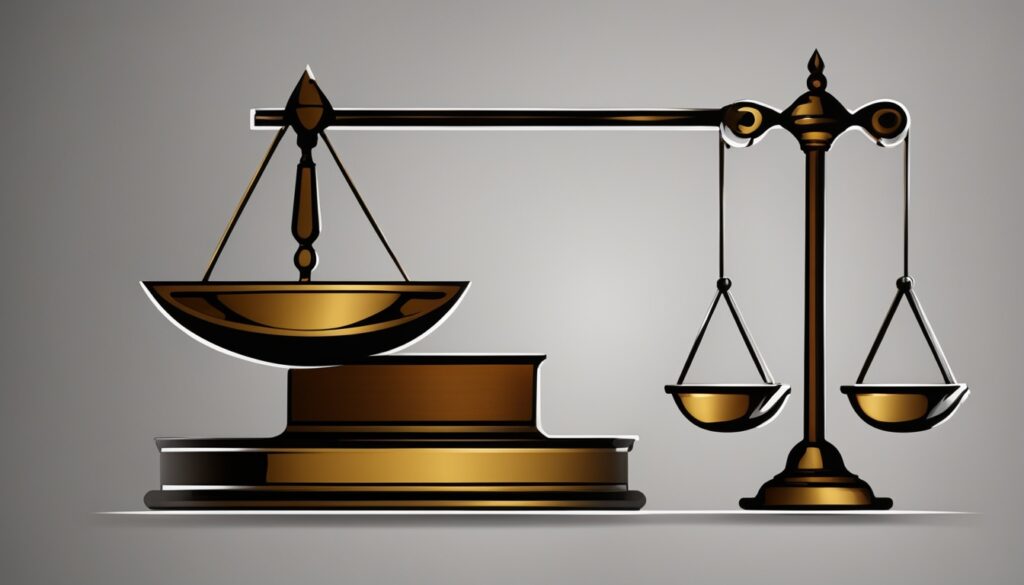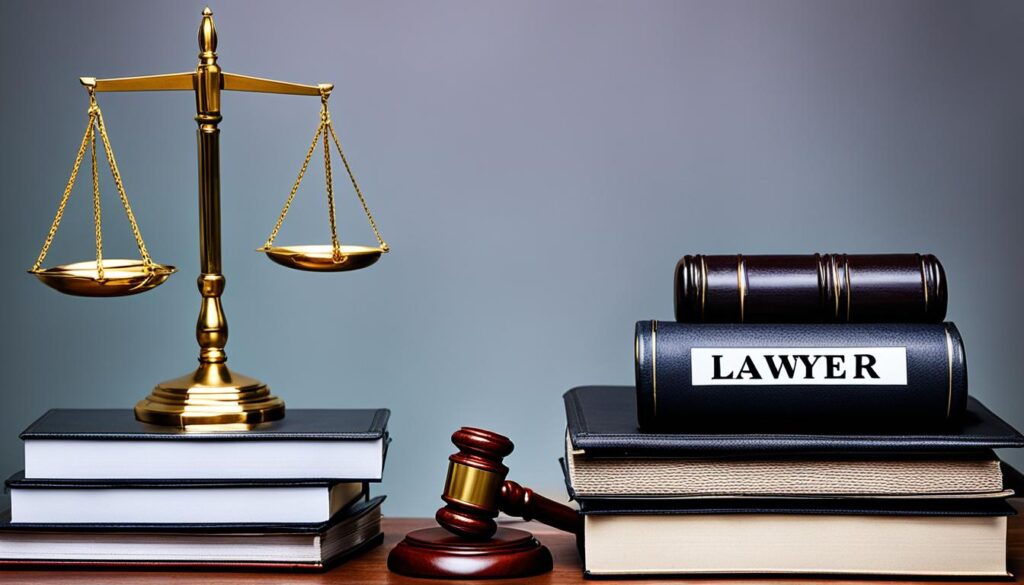In the United States, people often mix up the words “lawyer” and “attorney.” But, there’s a clear difference. It’s about their schooling, licenses, and what kind of legal work they do.
After law school, individuals become lawyers when they get a Juris Doctor (JD) degree. This degree opens many legal doors. They can be consultants, do research, or teach. However, not all lawyers get to represent clients in court or give legal advice.
Attorneys, on the other hand, have an extra step. They must pass the bar exam. This makes them legal to represent people in court. They can also negotiate and give solid legal advice. Passing the bar exam is what makes a lawyer into an attorney.
Key Takeaways
- Lawyers have a Juris Doctor (JD) degree, while attorneys have passed the bar exam and are licensed to practice law in a specific jurisdiction.
- Attorneys can actively represent clients in court and provide legal advice, while some lawyers may work in non-practicing roles.
- The terms “lawyer” and “attorney” are often used interchangeably, leading to confusion about the differences between the two.
- Understanding the distinction between lawyers and attorneys is crucial for those interested in pursuing a career in the legal profession.
- Factors such as licensing, experience, and specialization should be considered when choosing between an attorney or lawyer for legal representation.
Understanding the Difference Between Attorneys and Lawyers
In the world of law, we often mix up the words “lawyer” and “attorney.” This leads to confusion. It’s important to know the little details that set these two roles apart in the legal world.
Defining Attorneys and Lawyers
A lawyer has graduated from law school with a Juris Doctor (J.D.) degree. They know a lot about law and how it works. But, to work in a courtroom, a lawyer must also have a law license after passing the bar exam.
An attorney is a type of lawyer who can act in court. They can give legal advice and do various legal jobs. To become an attorney, a lawyer must pass the bar exam for a specific state or area.
Exploring the Origins of the Terms
The word “lawyer” comes from Middle English and means someone skilled in the law. “Attorney,” from French, means someone acting for others’ benefit.
In England’s legal system, solicitors and barristers once had different jobs. Solicitors usually handled paperwork and advice. Barristers represented people in court. But, in America, these roles gradually merged into what we now know as a lawyer or attorney.
| Key Differences | Lawyers | Attorneys |
|---|---|---|
| Definition | Individuals who have completed a law degree but may not be licensed to practice law | Lawyers who have passed the bar exam and are licensed to practice law in a specific jurisdiction |
| Education | Earned a Juris Doctor (J.D.) degree from an accredited law school | Earned a J.D. degree and passed the bar exam to obtain a license to practice law |
| Duties | May provide legal advice, draft documents, and assist with legal research | Can represent clients in court, provide legal advice, and engage in a wide range of legal practices |
| Licensing | Not required to be licensed to practice law | Must be licensed to practice law in a specific jurisdiction by passing the bar exam |
It’s vital to understand the differences between lawyers and attorneys if you need legal help. Knowing about their education, licensing, and what they can do helps choose the right professional for your legal issue.
Roles and Responsibilities: Attorney vs. Lawyer

Understanding attorneys and lawyers is key for those needing legal help. Although many use the words interchangeably, they serve varied roles and hold different qualifications.
The Role of an Attorney
Attorneys can represent clients in court after passing the bar exam. They are experts in the law and follow a strict code of ethics. Attorneys can work on both civil and criminal cases.
They offer guidance, negotiate, and speak for clients. Their tasks include preparing cases and ensuring client rights are respected. They need a deep understanding of the legal system and strong communication skills.
The Role of a Lawyer
Lawyers have a Juris Doctor (J.D.) degree and may not be court licensed. They have various legal roles, like giving advice or working in estate planning, immigration, or tax law.
They might work at law firms, for the government, or at companies. Even though they don’t always go to court, they are crucial in legal matters. Lawyers shape legal strategies and make sure laws are followed.
Knowing the differences between attorneys and lawyers is important when getting legal advice. This awareness helps people find the right legal professional for their specific needs. Thus, they can get quality, personalized legal assistance.
Educational and Licensing Requirements
In the U.S., becoming a legal professional involves rigorous training and licensing. Both attorneys and lawyers need a Juris Doctor (JD) degree. This degree comes after three years at an accredited law school.
However, their paths differ after getting the JD. Attorneys must pass the bar exam in their practice area. This exam covers legal knowledge, reasoning, and ethics. Attorneys also go through character and background checks. These make sure they meet the profession’s ethical standards.
In some states, calling someone a “lawyer” means they have a JD but lack a law license. California is one of these states. There, to be a licensed attorney, one must pass the tough state bar exam. This test has a low pass rate, just 32.5%.
| Requirement | Attorneys | Lawyers |
|---|---|---|
| Education | Juris Doctor (JD) degree from an ABA-accredited law school | Juris Doctor (JD) degree from an ABA-accredited law school |
| Licensing | Pass the bar exam in the jurisdiction where they intend to practice |
|
| Ethical Standards |
|
|
The training and licensing for legal professionals aim to ensure skilled and ethical service. Knowing these differences is important when needing legal help or understanding the law.
What is the Difference Between an Attorney and a Lawyer?

The Distinction in Definitions and Duties
The main difference between an attorney and a lawyer is their legal training and job duties. An attorney is a legal professional who passed the bar exam. They can help clients in court, give legal advice, and stand up for clients’ rights. On the other hand, a lawyer finished law school and got a law degree. However, they might not have the license to practice law in court.
Attorneys face higher testing standards and character checks to join the bar. This lets them take part in legal cases actively. Lawyers have a broader role, from offering legal advice to doing research, but they might not be able to go to court legally.
If we look at all lawyers, attorneys are a special kind. They must know more about specific legal fields. They also have to follow strict ethical rules from their state bar. These rules cover things like keeping client information private, avoiding conflicts of interest, and fair advertising. Lawyers without attorney licenses don’t have to follow these rules as closely.
| Attorney | Lawyer |
|---|---|
| Passed the bar exam and licensed to practice law | Graduated from law school but may not be licensed to practice law |
| Authorized to represent clients in court proceedings | May work in various legal roles without court representation |
| Must follow state bar’s code of ethical conduct | May not be subject to the same level of regulation and oversight |
| Specialized knowledge of legal fields and court practice | May have a more generalized legal knowledge |
Knowing the difference is key when you need legal help. Picking the right expert for your case means making sure your legal needs are met. It also protects your rights.
Other Legal Professionals: Solicitors, Barristers, and More
Besides attorneys and lawyers, the legal field includes key players like solicitors, barristers, advocates, and counsel. Each has their own role and area of expertise in the legal process.
In the UK, solicitors mainly work with clients and handle legal documents. They negotiate for clients and offer essential legal advice. Barristers focus on arguing cases in court and giving specialized legal opinions.
Advocate and counsel are broad terms for legal advisors and representatives. The U.S. uses “attorney” as a catch-all term for these roles, mixing what solicitors and barristers do.
| Legal Professional | Primary Responsibilities | Jurisdiction |
|---|---|---|
| Solicitor | Legal documentation, client negotiations, legal guidance | United Kingdom |
| Barrister | Courtroom advocacy, providing legal opinions | United Kingdom |
| Advocate | Legal advice and representation | Varies by jurisdiction |
| Counsel | Legal advice and representation | Varies by jurisdiction |
It’s key to know that legal terms and roles often change from place to place. This can make it hard to know exactly who you need to see for help. Being aware of these differences is important when you’re looking for legal advice.
“The legal field is a complex tapestry, woven with a diverse array of professionals, each contributing their unique expertise to the pursuit of justice.”
For any legal need, knowing about the various kinds of legal professionals can be helpful. Understanding what attorneys, lawyers, solicitors, and barristers do can guide you to the right expert for your situation.
Attorney-Client Privilege and Professional Conduct

Attorneys have a big responsibility in legally representing people. They have to follow strict ethical rules set by state bars and other authorities. One key rule they must follow is the attorney-client privilege.
The Importance of Attorney-Client Privilege
The attorney-client privilege is crucial for keeping talks between a lawyer and client private. It means what is discussed isn’t usually shared in court. The law has protected this privacy since the Roman Republic, and it became a solid rule in English law by the 16th century.
Here are some reasons why this privilege is important:
- It makes clients feel they can talk freely to their lawyers, sharing everything that’s important.
- It keeps clients’ dealings private and confidential when sorting out legal matters.
- It maintains the legal system’s honesty by building trust and truth between lawyers and clients.
For it to work, certain things must be true. A lawyer has to be involved, talks must be in private, and the client should be seeking legal help. But, there are times, like in planning a future crime, when the privilege won’t protect certain talks.
“The attorney-client privilege is the oldest privilege recognized by Anglo-American jurisprudence.”
Unlike the attorney-client privilege, confidentiality is a larger promise lawyers make to keep all client information safe. They must do this at all times, not just in court. This promise falls under the Rules of Professional Conduct, going beyond the attorney-client privilege.
Understanding attorney-client privilege and professional ethics is key for lawyers. They learn all about it to meet high ethical standards. This way, they can keep their clients’ trust and confidence.
Practicing Law in Different Jurisdictions
Lawyers in the legal world face the challenge of working in different places. They are allowed to practice in some areas but might not have this right everywhere. This makes it hard to help clients all over.
Attorneys and lawyers need to get a legal licensure to work in a certain place. This includes passing a tough exam and meeting state rules.
But, working as an out-of-state attorney in a new location has limits. They can’t automatically work there until they get a proper license or a special, temporary permission.
Still, lawyers not fully licensed in an area can sometimes help. This is through cross-jurisdictional practice, but it comes with a lot of rules. They need to work closely with a licensed lawyer to protect the client’s rights.
Working in many places means knowing lots of rules and how to follow them. Lawyers must follow the law closely. They also need to think about the limits of working outside their usual area.
“Attorneys must be vigilant in ensuring they are properly licensed and authorized to practice law in the jurisdictions where they serve their clients.”
To be effective and ethical, lawyers stay sharp about laws and where they can work. This lets them help clients well, keeping the legal field strong and fair.
Choosing the Right Legal Professional for Your Case

Selecting the right legal professional is key when dealing with the law. Whether you need legal representation or legal consultation, the attorney or lawyer you choose should fit your situation. Make sure to look at their skills and background closely. Here’s what to think about when picking a legal professional for your case.
Licensing and Experience
It’s crucial to pick an attorney or lawyer who is licensed where you need help. They should also have the right experience for your case. Choose someone who has won cases like yours before.
Communication and Rapport
Having good communication and a solid relationship is vital for legal representation. Your lawyer should listen well, explain things clearly, and care about your case and what you need.
Availability and Responsiveness
It’s important that your attorney or lawyer is available when you need them. They should respond to your questions quickly. Make sure they have enough time for your case.
Reputation and Track Record
Looking into a legal professional’s reputation and past work can tell you a lot. Check reviews and client feedback. This can give you an idea of what to expect.
Fee Structure and Transparency
Know how much and how you’ll be charged upfront. See if there are any hidden costs. A good lawyer will be clear about what you’ll pay.
Choosing the right legal professional is very important. Think about these points carefully. This can help you have a good experience with your legal representation or consultation.
Conclusion
It’s crucial to know the difference between attorneys and lawyers if you need legal help. Attorneys are approved to practice law. They can represent you in court and handle any legal processes. But lawyers might not have the okay to work on their own.
The job differences also show in what they can do. Attorneys are more powerful, able to fight cases and solve them without going to court. On the other hand, lawyers mainly give advice and can’t do as much in court.
So, when you have a legal issue, choose your legal professionals wisely. Think about whether you need an attorney or a lawyer. Knowing the difference will help you get the right legal advice or representation for your situation.
